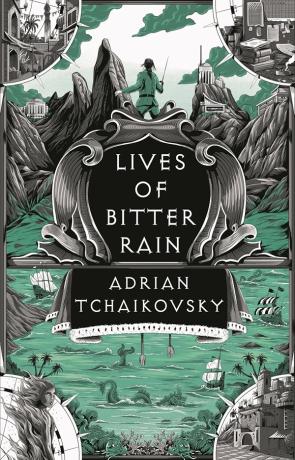Honest Uplift a Guest Post by Author Stephen Cox
The Bookseller polled agents recently, and they saw one major trend for 2022 as ‘Joy-seeking, as readers continue to gravitate towards books that inspire, lighten, and distract...’ They also dubbed an increase in science fiction sales as showing the desire for ‘escapism’. Almost any book distracts, or could be used to ‘escape’, but never mind.
As I hear some sneering from all around me, some thoughts.
People are allowed to have different tastes in what they read and write.
I want my work to bring other people joy. Primarily I hope it entertains them, but if that inspires them, or lightens their load a little, what is wrong with that? Uplift is good, it is not pandering to immature tastes.
Writing can do this in many ways, some lighter than others. I pass over those for whom joy is the perfect description of a skull split in two.
Let me briefly outline a capable non-SFF book I read, as Voltaire said, in a spirit of inquiry. The Undomestic Goddess by Sophie Kinsella. Her heroine is a brilliant hardworking corporate lawyer whose domestic ability is that of a toddler. She is blamed for a terrible error at work that costs the firm millions, she flees in shame to the country, where she somehow agrees to be housekeeper to a demanding nouveau couple. Somehow, despite several amusing really-she’d-be-sacked-on-the-spot incidents, she pulls it off. When early on, the handsome, tanned down to earth country fellow hoves into view, the rough ending of the book is clear – as clear as if his name was LOVE INTEREST. So, it did the job of lifting my mood, but it is not set in a world of real consequences.
I prefer uplift which is honest - physical reality and other human beings can be horrible, and some things don’t end well. In Our Child of the Stars, my heroine spends much of the first book fearing her child will die or be taken from her. The couple has been through an awful couple of years, and they have to rebuild their relationship. But the reader gets joy from their successes.
My first defence of joy is for its own sake. People can write SFF as light as Kinsella, or stuff which is Reservoir Dogs on coke, or the Iliad in space. Even if the characters are knee deep in shit, blood, and pessimism, there is joy in dry boots, being alive and a joke afterwards. Much dark writing gives the glow of doing a marathon in the rain. The end is the stronger for what you went through.
Are trends and labels helpful? I look awry at noblebright fantasy if its aim is monotone characters. I prefer the flawed person muddling though. We hold golden truths in clay vessels. Solarpunk looks for sustainable futures and hopepunk could be an attempt to placate the gloomerati by saying hope is spiky. But it is spot on - it can be radical to offer hope.
My second defence of joy is around what we owe each other. If the powers that be cannot achieve mindless adoration, a cynical detachment and universal despair work almost as well for them. Science fiction has the power to imagine better futures and hint how they might be achieved. Utopias might not be practical, we might not like what we might sacrifice to get there. But let us not concede the future must be as a few thousand over-wealthy, over-spoiled, and largely white men want it to be.
Science fiction can be clear eyed about the challenges we face. We are fond of writing warnings, often whole dystopias. We have been making these for decades and with each one coming real, we tell people we told them so. Scaring people more may not stir them to action. Adding hope, adding joy, lifting them up may do so.
Novels need to be stories before they are sermons. Terry Pratchett gave us people we cared about, made us laugh, and landed some interesting messages on the sly. I remember the old vaudeville motto, ‘Make them laugh, make them cry, make them think, and send them home with a song.’
You can read the review for Our Child of Two Worlds at https://sfbook.com/our-child-of-two-worlds.htm
News Archives
- August 2024
- July 2023
- April 2023
- February 2023
- September 2022
- March 2022
- February 2022
- July 2021
- June 2021
- April 2021
- March 2021
- January 2021
- October 2020
- September 2020
- June 2020
- March 2020
- May 2019
- January 2019
- November 2018
- January 2016
- September 2015
- August 2015
- July 2015
- June 2015
- May 2015
- April 2015
- March 2015
- January 2015
- October 2014
- June 2014
- April 2014
- March 2014
- February 2014
- January 2014
- December 2013
- November 2013
- October 2013
- September 2013
- June 2013
- May 2013
- April 2013
- March 2013
- January 2013
- December 2012
- November 2012
- August 2012
- July 2012
- June 2012
- May 2012
- April 2012
- March 2012
- February 2012
- January 2012
- December 2011
- November 2011
- October 2011
- September 2011
- August 2011
- July 2011
- June 2011
- May 2011
- April 2011
- March 2011
- February 2011
- January 2011
- December 2010
- November 2010
- October 2010
- September 2010
- August 2010
- July 2010
- June 2010
- May 2010
- April 2010
- March 2010
- February 2010
- January 2010
- December 2009
- November 2009
- October 2009
- September 2009
- August 2009
- July 2009
- June 2009
- May 2009
- April 2009
- March 2009
- February 2009
- January 2009
- December 2008
- November 2008
- October 2008
- September 2008
